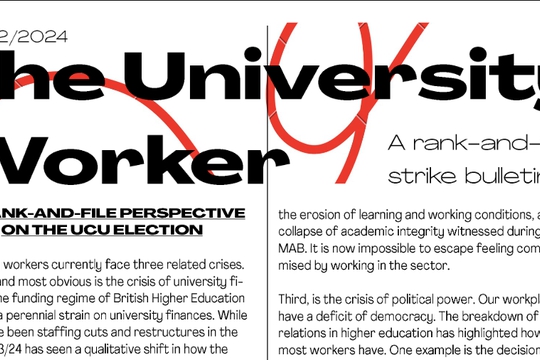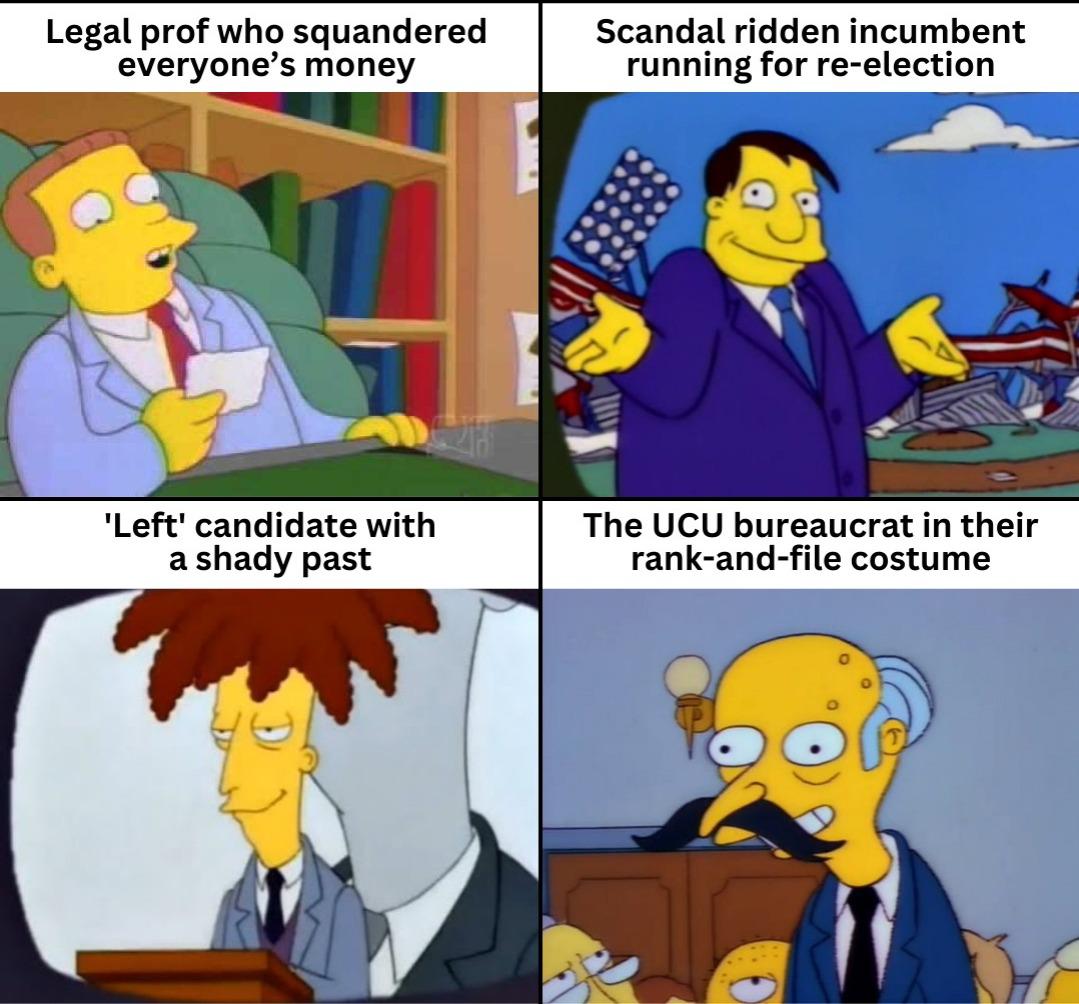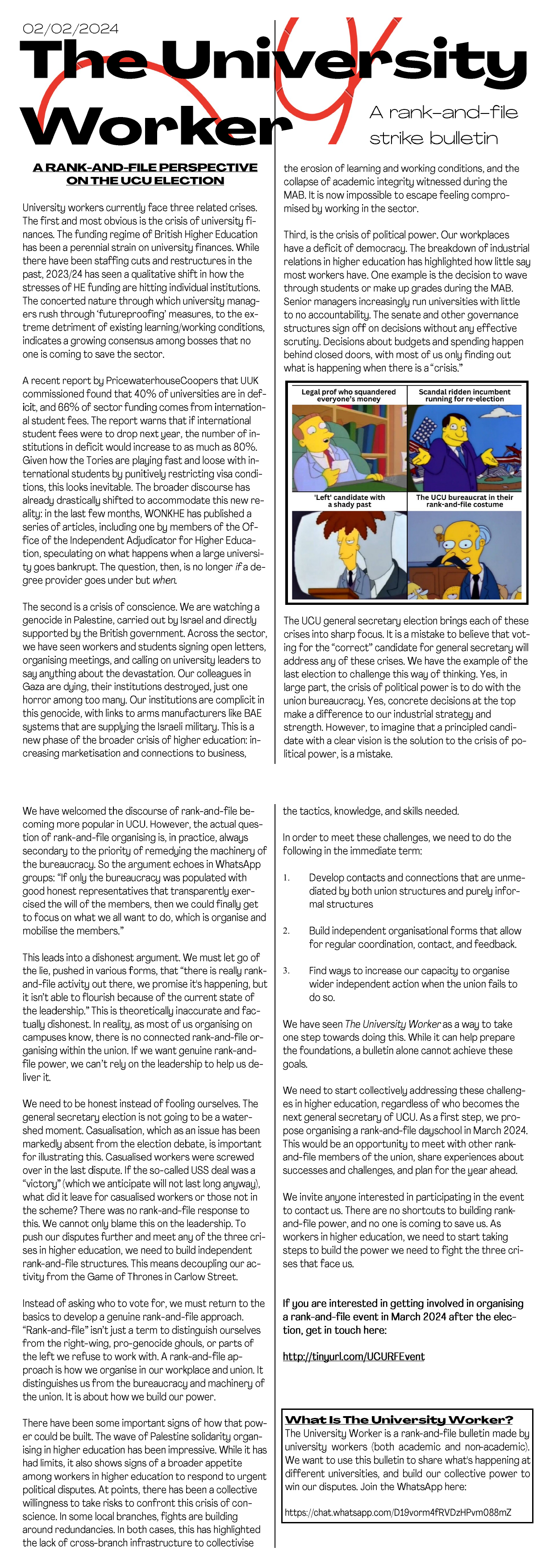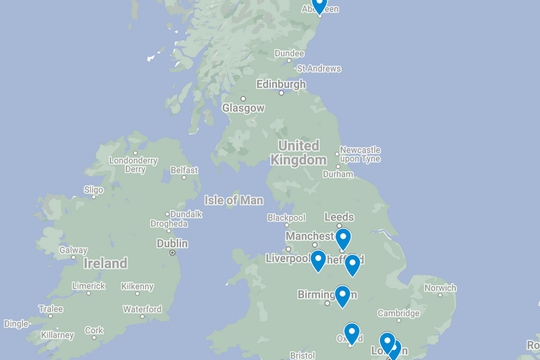A rank-and-file perspective on the UCU elections

bulletins
A rank-and-file perspective on the UCU elections
by
The University Worker
/
Feb. 2, 2024
A rank-and-file perspective on the UCU elections
The University Worker is a rank-and-file bulletin made by university workers, that has been produced since 2018. This is for Friday 2nd February 2024.
We encourage people to print copies out and hand them out at your university! At the bottom of the page you can find downloadable pdfs to print off. The article is reproduced in full below.
A rank-and-file perspective on the UCU elections
University workers currently face three related crises. The first and most obvious is the crisis of university finances. The funding regime of British Higher Education has been a perennial strain on university finances. While there have been staffing cuts and restructures in the past, 2023/24 has seen a qualitative shift in how the stresses of HE funding are hitting individual institutions. The concerted nature through which university managers rush through ‘futureproofing’ measures, to the extreme detriment of existing learning/working conditions, indicates a growing consensus among bosses that no one is coming to save the sector.
A recent report by PricewaterhouseCoopers that UUK commissioned found that 40% of universities are in deficit, and 66% of sector funding comes from international student fees. The report warns that if international student fees were to drop next year, the number of institutions in deficit would increase to as much as 80%. Given how the Tories are playing fast and loose with international students by punitively restricting visa conditions, this looks inevitable. The broader discourse has already drastically shifted to accommodate this new reality: in the last few months, WONKHE has published a series of articles, including one by members of the Office of the Independent Adjudicator for Higher Education, speculating on what happens when a large university goes bankrupt. The question, then, is no longer if a degree provider goes under but when.
The second is a crisis of conscience. We are watching a genocide in Palestine, carried out by Israel and directly supported by the British government. Across the sector, we have seen workers and students signing open letters, organising meetings, and calling on university leaders to say anything about the devastation. Our colleagues in Gaza are dying, their institutions destroyed, just one horror among too many. Our institutions are complicit in this genocide, with links to arms manufacturers like BAE systems that are supplying the Israeli military. This is a new phase of the broader crisis of higher education: increasing marketisation and connections to business, the erosion of learning and working conditions, and the collapse of academic integrity witnessed during the MAB. It is now impossible to escape feeling compromised by working in the sector.
Third, is the crisis of political power. Our workplaces have a deficit of democracy. The breakdown of industrial relations in higher education has highlighted how little say most workers have. One example is the decision to wave through students or make up grades during the MAB. Senior managers increasingly run universities with little to no accountability. The senate and other governance structures sign off on decisions without any effective scrutiny. Decisions about budgets and spending happen behind closed doors, with most of us only finding out what is happening when there is a “crisis.”

The UCU general secretary election brings each of these crises into sharp focus. It is a mistake to believe that voting for the “correct” candidate for general secretary will address any of these crises. We have the example of the last election to challenge this way of thinking. Yes, in large part, the crisis of political power is to do with the union bureaucracy. Yes, concrete decisions at the top make a difference to our industrial strategy and strength. However, to imagine that a principled candidate with a clear vision is the solution to the crisis of political power, is a mistake.
We have welcomed the discourse of rank-and-file becoming more popular in UCU. However, the actual question of rank-and-file organising is, in practice, always secondary to the priority of remedying the machinery of the bureaucracy. So the argument echoes in WhatsApp groups: “If only the bureaucracy was populated with good honest representatives that transparently exercised the will of the members, then we could finally get to focus on what we all want to do, which is organise and mobilise the members.”
This leads into a dishonest argument. We must let go of the lie, pushed in various forms, that “there is really rank-and-file activity out there, we promise it’s happening, but it isn’t able to flourish because of the current state of the leadership.” This is theoretically inaccurate and factually dishonest. In reality, as most of us organising on campuses know, there is no connected rank-and-file organising within the union. If we want genuine rank-and-file power, we can’t rely on the leadership to help us deliver it.
We need to be honest instead of fooling ourselves. The general secretary election is not going to be a watershed moment. Casualisation, which as an issue has been markedly absent from the election debate, is important for illustrating this. Casualised workers were screwed over in the last dispute. If the so-called USS deal was a “victory” (which we anticipate will not last long anyway), what did it leave for casualised workers or those not in the scheme? There was no rank-and-file response to this. We cannot only blame this on the leadership. To push our disputes further and meet any of the three crises in higher education, we need to build independent rank-and-file structures. This means decoupling our activity from the Game of Thrones in Carlow Street.
Instead of asking who to vote for, we must return to the basics to develop a genuine rank-and-file approach. “Rank-and-file” isn’t just a term to distinguish ourselves from the right-wing, pro-genocide ghouls, or parts of the left we refuse to work with. A rank-and-file approach is how we organise in our workplace and union. It distinguishes us from the bureaucracy and machinery of the union. It is about how we build our power.
There have been some important signs of how that power could be built. The wave of Palestine solidarity organising in higher education has been impressive. While it has had limits, it also shows signs of a broader appetite among workers in higher education to respond to urgent political disputes. At points, there has been a collective willingness to take risks to confront this crisis of conscience. In some local branches, fights are building around redundancies. In both cases, this has highlighted the lack of cross-branch infrastructure to collectivise the tactics, knowledge, and skills needed.
In order to meet these challenges, we need to do the following in the immediate term:
- Develop contacts and connections that are unmediated by both union structures and purely informal structures
- Build independent organisational forms that allow for regular coordination, contact, and feedback.
- Find ways to increase our capacity to organise wider independent action when the union fails to do so.
We have seen The University Worker as a way to take one step towards doing this. While it can help prepare the foundations, a bulletin alone cannot achieve these goals.
We need to start collectively addressing these challenges in higher education, regardless of who becomes the next general secretary of UCU. As a first step, we propose organising a rank-and-file dayschool in March 2024. This would be an opportunity to meet with other rank-and-file members of the union, share experiences about successes and challenges, and plan for the year ahead.
We invite anyone interested in participating in the event to contact us. There are no shortcuts to building rank-and-file power, and no one is coming to save us. As workers in higher education, we need to start taking steps to build the power we need to fight the three crises that face us.
If you are interested in getting involved in organising a rank-and-file event in March 2024 after the election, get in touch here: http://tinyurl.com/UCURFEvent
We encourage workers to share their own reports from the picket lines, as well as ideas for how we can make the reballot a success, by filling out the form here. You can also join the WhatsApp announcement group for The University Worker by clicking here.

author
The University Worker
Subscribe to Notes from Below
Subscribe now to Notes from Below, and get our print issues sent to your front door three times a year. For every subscriber, we’re also able to print a load of free copies to hand out in workplaces, neighbourhoods, prisons and picket lines. Can you subscribe now and support us in spreading Marxist ideas in the workplace?
Read next

The University Worker: 2023 redundancies
by
The University Worker
/
Dec. 15, 2023

